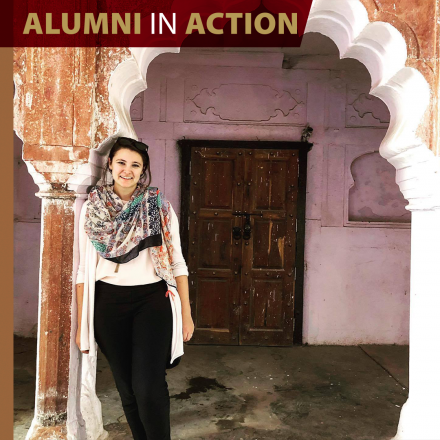Slattery and her team at The Hunger Project leveraged their network of 500,000 leaders, including nearly 333,000 women, to spread awareness about the COVID-19 pandemic among communities most at risk for contracting and suffering complications from the disease.
As the effects of the COVID-19 pandemic spread across the globe, those experiencing hunger and poverty are most at risk for contracting and suffering complications from the disease. These are precisely the populations that Anna Slattery ’13 and her team at The Hunger Project, an organization committed to ending world hunger, are working to support.
 While at Elon, Slattery displayed her passion for international development. She majored in international studies, was involved with Model UN and participated in study abroad opportunities in Ghana and China. She also completed several internships in Washington, D.C., first as a consultant with the Department of Defense and then with the U.S. Agency for International Development. During these internships, she became involved in communications and followed that path to her current position as Communications Officer for The Hunger Project, where she continues to work in international development.
While at Elon, Slattery displayed her passion for international development. She majored in international studies, was involved with Model UN and participated in study abroad opportunities in Ghana and China. She also completed several internships in Washington, D.C., first as a consultant with the Department of Defense and then with the U.S. Agency for International Development. During these internships, she became involved in communications and followed that path to her current position as Communications Officer for The Hunger Project, where she continues to work in international development.
According its website, The Hunger Project aims to “end hunger and poverty by pioneering sustainable, grassroots, women-centered strategies and advocating for their widespread adoption in countries throughout the world.” In the communities The Hunger Project supports, women bear the bulk of the responsibility in regards to supporting a family’s basic needs. The Hunger Project states “when women are supported and empowered, all of society benefits. Their families are healthier, more children go to school, agricultural productivity improves and incomes increase. In short, communities become more resilient.” For this reason, The Hunger Project believes supporting and empowering women are essential ways to achieve the end of hunger and poverty.
In February 2020 Slattery was assigned to the Global COVID-19 Task Force, a five-person team charged with managing the organization’s COVID-19 response. The task force’s responsibilities include “shutting down offices and moving all operations online, to pivoting from traditional community-based programs to ones that adhere with the public health guidelines put forth by the World Health Organization, to communicating about a COVID-19 response with stakeholders,” says Slattery. Slattery and her team mobilized to slow the spread and mitigate the impact of COVID-19 within the communities they aid. The team used their networks and resources to leverage a community of 500,000 leaders (including nearly 333,000 women) to spread awareness about the pandemic through 14,000 villages in Africa, Latin America and South Asia, reaching an estimated 16.5 million people.
“For me, this crisis is really emphasizing the importance of investing in community leadership,” Slattery says. “Community leaders create resilient communities and resilient communities are the ones that will come out of this best.”
Slattery places an emphasis on incorporating community leadership with COVID-19 vaccine rollout. “We must involve people leading at the grassroots level. They will be key to reaching the most vulnerable in each community and to ensuring widespread acceptance of the vaccine. This applies globally—community leaders will be as important in this campaign in North Carolina as they are in Ghana.”
About this series: The Elon Alumni in Action series explores the stories of university graduates who are doing important and uplifting work in their careers and their communities. To share the names of alumni you think should be considered for this series, please fill out the Alumni in Action nomination form.


